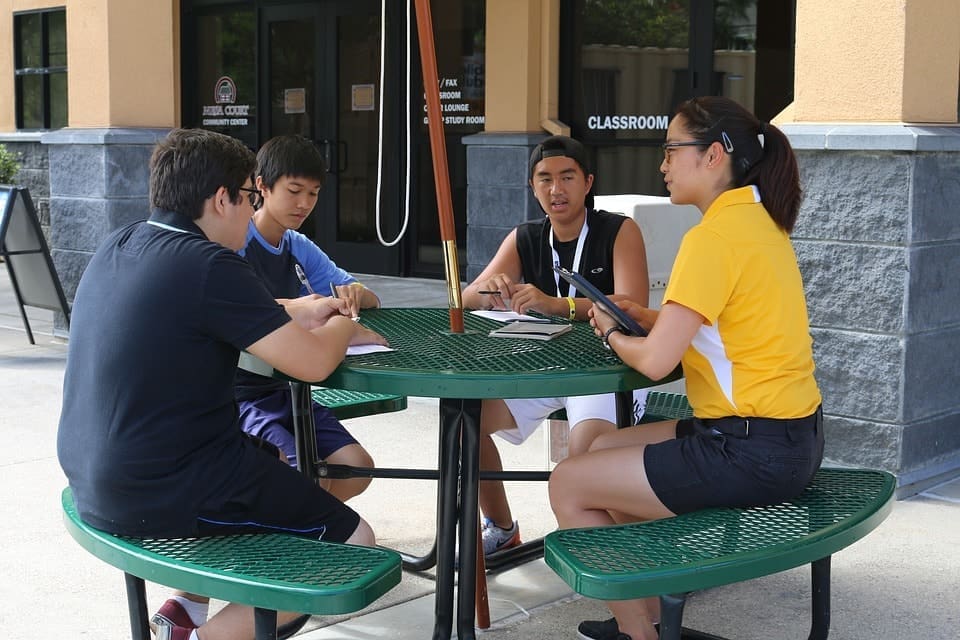College can be a tough gig – long hours spent in class and meeting assignment deadlines; figuring out how to afford it all; having some semblance of social life. With all of this activity, most students don’t think about “networking.”
Networking – It Isn’t Just for the Employed
What in the world does college have to do with networking? We usually think of that as something that career guys do – handing out business cards at parties; joining business networking groups; getting on LinkedIn, joining discussion groups and widening a network of contacts. The purpose is to gain additional clients or to pursue career changes.
College students are getting the idea of career preparation by establishing websites, maintaining online portfolios and blogs, and even creating profiles on LinkedIn. But engaging in networking is not something they often think about. And they should.
What College Networking Can Accomplish
Having a pool of professional contacts within your niche means that there are people who know you, know your work, and who can provide mentoring, referrals and references when you go after that first career position.
Remember this: about 80% of jobs are not actually advertised. So, if you want to find out about those openings, you will have to hear about them from those in your network. And that network can only be built over time. The time to start is now.
Here are some practical and actionable ideas for you to accept the challenge of building networking relationships now – relationships that could land you that first great job. And there is good news in all of this: it is pretty easy to develop a network if you work at it a little at a time and consistently.
- It Begins with a Mindset
“You don’t have to be an expert in your niche yet, but you can have a curiosity and you can come up with questions and requests for advice. This makes others feel valued and think of you as someone who has an interest in them and the career field in general,” explains Karina Cisneros, an HR manager at GetGoodGrade. Develop a mindset of asking questions of everyone you meet – people like to see a natural curiosity in young people.
- What Happens in College Does Not Stay in College
You have to be mindful of your reputation and the image you portray while in college. This isn’t to say you cannot party and have a great social life. And you already know enough to know that you aren’t going to spread images of your misdeeds on social media. But, if you get a reputation on campus for being unethical or unprincipled or a “moocher,” your peers will remember these things. Years later, when you might want to connect with them as a part of your network, they may not be much willing to do so.
- Join Open Source Communities
One of the best ways to make a name for yourself and to connect with lots of other professionals is to join free communities (blogs, forums) and contribute something significant. Wanda Cairns, content editor for various essay services, explains further: “You can build a reputation among the industry community in this way, not to mention the fact that many in these communities are employed. They can turn you on to openings and certainly put in a good word for you if they are impressed with your work.”
- Pursue Internships
There are a lot of great internships for students, but they are competitive. If you want to get a job in IT, for example, don’t just look at design and development companies. Check out the “big boys” like Disney and Google. A lot of students don’t consider the big corporations, but, in fact, they hire lots of interns in all career areas, including IT. Through an internship, you can pick up mentors and references, at the very least.
Internships can lead to jobs if you have made a good and lasting impression. Companies like to hire a “known quality,” and you can be that if you make the effort not just to perform well but to fit in with the culture and environment.
If you are not able to get an internship, offer to volunteer. You will gain valuable experience, ingratiate yourself with those already in your career field, and have both mentors and sources for references.
- Get Involved in Organizations
There are a host of professional IT associations, and most of them admit members who are still in school. Pick a couple and join. Attend local, regional, and even national conferences of these associations whenever you can. You will make many connections – connections who can help you land your first career position upon graduation.
- Widen Your Horizons Among Fellow Students
Fellow students are great opportunities for friendships during college and also for connections after graduation, often for years. But there are other students in many of your classes who are not your primal majors. You will be enrolled in many additional classes because they are required courses for graduation.
“And there is a whole mixture of student demographics and majors,” shares Sonny Hussain, customer success manager and blogger. “Establishing relationships with them can be beneficial while you are in school. Set up study groups in which you can create list of reviews for your essays or mutually assist one another with coursework assignments.”
These relationships may go far into adulthood. These friends will ultimately have career positions, and some may be in large enterprises with IT departments that have a need for expert coders, for example. You simply do not know where these relationships will lead in the future.
- Parents of Your Friends Can be Great Networking Contacts
Most college students develop close personal relationships with at least a few fellow students. And, in the course of their years in college, they will have the opportunity to meet the parents of these friends. If you discover that any of these parents may be helpful to you, take advantage of the connection, for they often have connections too. Ask for career advice. If they see you as a motivated, smart student, they will be willing to provide introductions to their connections who may, in turn, have career opportunities for you.
- Don’t Forget Your Professors
Professors in your upper-level major coursework are experts in their fields. They have PH.D.’s; they are well-known in the industry; they have many connections outside of academia. You need to be more than an attentive and participatory student in the class. Your professors have office hours. Make appointments; discuss your career goals; ask for advice; show your enthusiasm for the profession.
Often, employers contact professors directly for referrals for openings they have. You could be that person your professors recommend.
Networking in College – It’s Important to Your Future
It is never too early to begin networking. Every relationship that is formed while you are in college is a potential connection for gaining your first career position and for career growth later on. Networking for career professionals never stops, but beginning in college can give you a better head start than your peers.
Put yourself out there, make those connections, develop those relationships. And while you do it, remain ethical, honest, motivated, and enthusiastic and project that to all you meet, both on and offline.
College should be fun, of course. But if you set aside some time to network on a regular basis, you may graduate with a job already in your pocket and a core group of people that are “connections” for life.
Image credits: Image credits: Image credits






